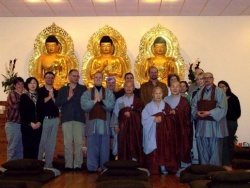Ambiguous beliefs
Ambiguous beliefs The ambiguous views/beliefs/faiths were basically purportedly indecisive (ambiguous) declarations on anything the believer wasn't sure of (or lack knowledge) about something, which they avoid answering in order to avoid mistake or criticism. They even sometimes talk so elaboratively that it confused their audience. For example, if an ambigous believers were asked, "What is the meaning of merit and demerit?" They would respond (please follow closely the circuitous logic they played here), "I do not understand correctly what is merit or what is demerit. If I were to say what is merit, without really understanding it as being merit, or what is demerit, without really under standing it as being demerit, I may be stating a falsehood.
This false statement of mine would cause me distress. Such distress might be harmful to me." (1) In order to avoid distress (which will hinder the path of self liberation) of being mistaken or critisized, they chose the path of not stating anything. So he would state, "I will not state this, nor I'm not saying that. I'm not stating a difference of opinion. I am not rejecting you opinion and I'm not stating this and that." This was one of four belief of how ambiguisms came to exist. The second belief was similar. The difference was that they were afraid that the distress, pleasure, disappointment, of being either agreed nor rejected would cling on them and hinder them from their path of self-liberation. Thus, they avoided to answer. The third belief was similar. The difference was that in this case, they were afraid of able scholars, experts in debate, skill tongued ascetics, which will lure them into a question, and when they answered they would attack him till he lost. This lost would yield a great regret and grief, and they feared that it would hinder their path of salvation.
The fourth belief was based on the folly and the ignorance of the Brahmins or the ascetics. Therefore, whenever they were asked a question, they would answer it in elusive and confusing way. "If I were asked, 'Is there another world?' and if I took it that there is, I should answer, 'There is another world'. But I would not say this way, nor that way, nor the other way; neither would I say not this way, not that way, not, the other way; nor would I say otherwise." (1) All of the followers of these beliefs defended and clung on their faith and didn't believe in another faiths.
